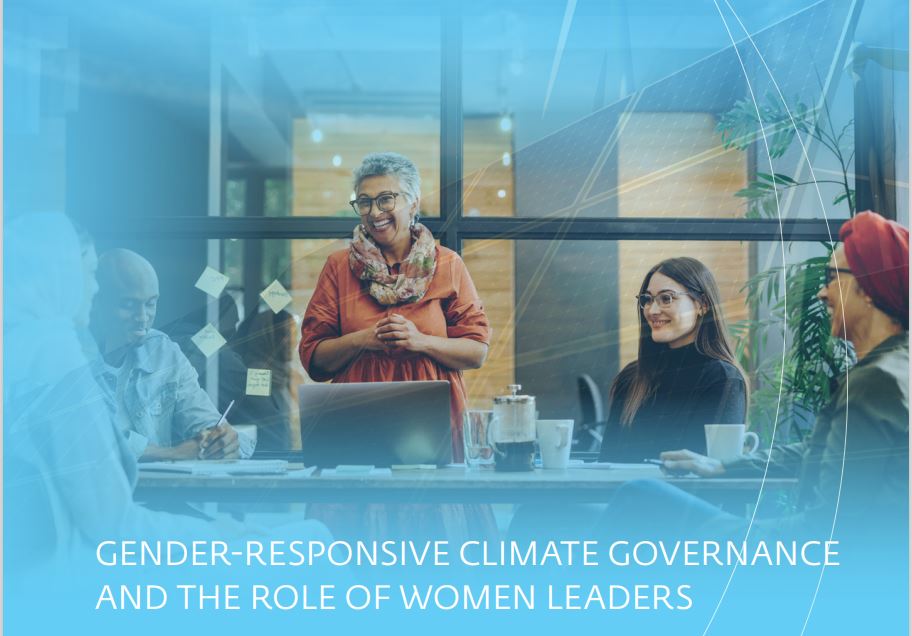
Gender-Responsive Climate Governance and the Role of Women Leaders
This study delves into the intersection of climate governance and gender diversity and inclusion (gender D&I) within companies based in emerging market and developing economies (EMDEs). It expands the emerging research field of gender-responsive climate action by addressing a crucial knowledge gap: how businesses in EMDEs are engaging with the gendered dynamics of climate change through their governance practices, policies, and actions. The research reveals how women leaders are or can be pivotal in shaping businesses' climate actions and offers insights into best practices and guidance for board members, senior managers, and other relevant stakeholders, including stock exchanges and market regulators operating in EMDE contexts.
The findings indicate that while many EMDE-based companies are increasingly attentive to climate and gender-related issues, they often consider them separately. Few companies integrate gender considerations into their climate-related activities, partly due to a lack of understanding of the complex interactions between gender dynamics and the climate crisis. This siloed approach can lead to misaligned strategies, reduced impact potential, or unintended consequences that may exacerbate women's vulnerability to climate change impacts.
One reason for this lack of integration is that many EMDE businesses have not formalized their climate governance. Establishing a strategic framework that incorporates a gender perspective could enable a coordinated and comprehensive approach addressing gender-differentiated needs.
The study also found that EMDE businesses with a higher proportion of women in senior management and on boards were more likely to have formalized climate governance commitments. Gender-diverse leadership can accelerate climate action and improve both climate governance and gender-equality outcomes in EMDE-based companies, but greater awareness and action are needed.
Key insights from the survey, interviews, and focus groups reveal that adapting gender-responsive climate governance is a gradual process with multiple steps for companies and stakeholders to advance progress.
Recommendations: Towards Gender-Responsive Climate Governance in EMDE Companies
Stages of Gender-Responsive Climate Governance:
- Preliminary Stage: Not currently addressing climate and gender issues.
- Early Stage: Recognizing the connection between gender D&I and climate but not yet taking action.
- Early-Mid Stage: Considering climate issues with a gender lens and taking some uncoordinated action.
- Mid-Advanced Stage: Integrating gender-responsive climate considerations, including performance measurement, into many business areas.
- Advanced Stage: Embedding gender-responsive climate governance and related actions, including performance measurement and reporting, into business strategy and recognizing them as critical topics.
For Boards and Governance Bodies of EMDE-Based Companies:
- Raise Awareness: Conduct and share research, draw connections with existing objectives, and make gender-responsive climate action a strategic agenda item for senior leadership and board meetings.
- Develop Strategies and Policies: Assess the current position in climate governance and gender D&I, and develop appropriate short-, medium-, and long-term actions using tools such as the IFC's Climate Governance Progression Matrix.
- Set Targets for Women's Leadership: Establish targets for positions directly responsible for climate action and sustainable transformation, measure progress, and appoint women with expertise in climate and environmental sustainability.
- Evaluate Risks and Opportunities with a Gender Lens: Assess physical climate risks on operations and communities while considering gender-specific vulnerabilities and create gender and climate indicators.
For Regulators and Policymakers:
- Design Innovative Policies: Integrate gender considerations into climate policies and vice versa, accounting for local contexts to improve effectiveness.
- Create Inclusive Frameworks: Tailor compliance and reporting requirements to company size, resources, and maturity, simplify disclosure processes, and provide practical tools and training.
- Mandatory Reporting: Require companies to disclose gender and climate-related data, actions, and impacts, and define reporting frameworks.
- Offer Incentives and Recognition: Provide tax incentives, grants, and awards for exemplary efforts in gender-responsive climate governance, particularly for MSMEs.
- Mainstream Climate and Gender Equality: Embed climate and gender as core objectives in strategies and operations with clear targets and indicators.
- Develop the Business Case and Lead Research: Focus research on the intersection of women's leadership, climate action, and climate governance to assess progress.
- Training and Capacity Building: Provide training on gender-inclusive climate governance for employees at all levels and invest in building the capacity of staff and partners.
- Data Collection and Reporting: Collect, analyze, and report gender-disaggregated data to inform evidence-based policymaking.
- Dedicated Financing: Offer targeted funding for initiatives focused on advancing climate and gender governance.
- Collaborate with Stakeholders: Act as global conveners to leverage resources, share knowledge, and coordinate efforts in addressing climate and gender challenges, emphasizing engagement with local communities.
Report : https://www.ifc.org/content/dam/ifc/doc/2024/gender-responsive-climate-governance-report.pdf